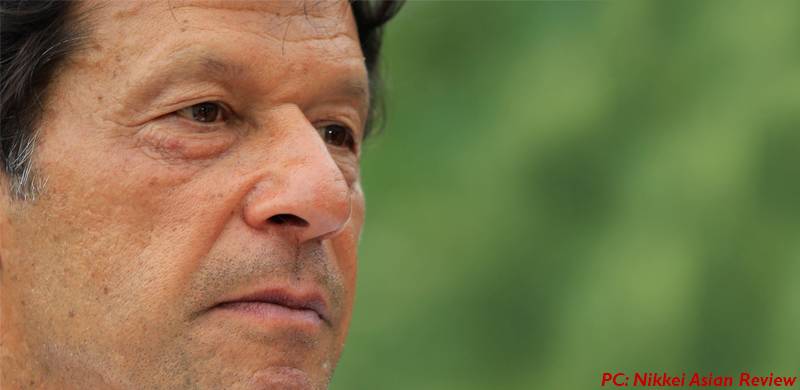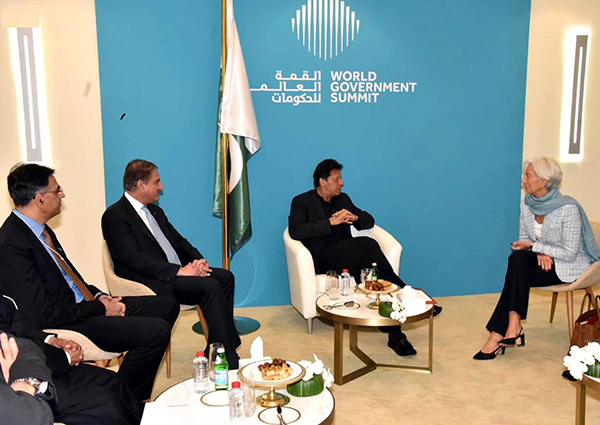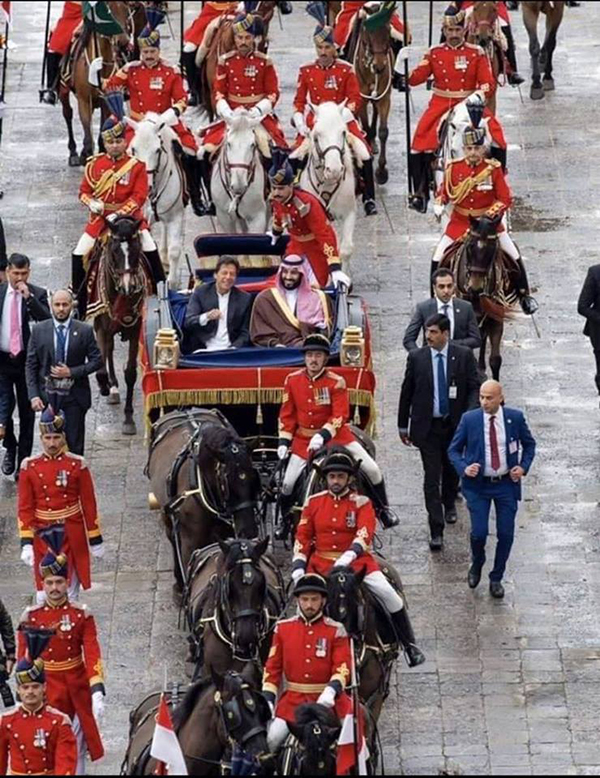
Ahmad Faruqui in this article details how the unfulfilled promises are taking a toll on the incumbent government's popularity. However, he feels that things can still improve if Imran Khan makes some basic changes to these seven things.
What type of grade does one assign to a man who promised greatness but who failed to deliver? For each promise that was broken, a new promise was made.
The people of Pakistan were played with, taken for a ride in the merry-go-round of promises. In a theme park, that would have been quite entertaining. In the real word, it was a betrayal of the trust that the people had reposed in him.
Never before in history had a leader promised the rapid arrival of greatness as had Imran Khan. The number one issue in his election campaign was the elimination of corruption, beginning with the politicians, and extending to the civil service and beyond. We were told that he’d bring home $200 billion of “looted wealth” on the first day he took office.
In his opening speech, he said he would create a wonderland where prosperity would reign. Not a single citizen would qualify for charity. He said he would not go to the Gulf Arab states with a begging bowl and he would spurn the IMF.
Seeking to stake the high ground, the “New Pakistan” would resemble the Old Islamic State that was established in Arabia, rich in moral fiber and strong in character. And it would combine the best features of 7th century Arabia with those of 21st century welfare states in Scandinavia and China. In other words, Imran Khan envisaged placing the New Pakistan within a virtuous but incongruous triangle formed by those three states.

A man who was launched into stardom by winning the Cricket World Cup in 1992, a man who had been confined to the backwater in the world of politics, and a man who had reinvented himself as a philanthropist was not expected to head the Government of Pakistan.
Imran’s unexpected political success surprised many, possibly including himself. His success came from promising the citizens what they desired. A better quality of life, a better job, a better house, and fair play in all aspects of life. He also promised to raise the status of Pakistan in the comity of nations, to resolve long lingering disputes with neighbors, and to resolve the Kashmir problem. He was destined to greatness and would bring Jinnah’s vision to fruition that all others who had led the country had failed to do. For one shining moment, it seemed that fate was on his side.
As his first year nears completion, it’s clear that he has failed to deliver. None of the looted wealth has been returned, corruption is still rampant, and he has gone begging not only to the Gulf Arab states but also to the IMF.

He has made more U-Turns than any other political leader in such a short amount of time. But reality is beginning to sink in. He has admitted that the country is experiencing the worst economic crisis in its 72-year old history.
He cannot keep on blaming these problems on his predecessors. If you stretch the truth, people begin to see through it.
The Rupee is in a free fall, exports are not growing, imports are rising, and the balance of payments is in crisis. Debt repayments loom like dark clouds on the horizon.
Tax collection remains low but no substantial cuts have been made in government spending. Selling off the cars and the cows of the prime minister’s house turned out to be a publicity gimmick with no impact on the budget deficit. Domestic savings rates remain low, necessitating the need to borrow from the Gulf Arab countries and the IMF.
The idea of building a mega dam providing water and electricity to a country that is scarce in both sounded like a Godsend, especially since it was not going to be built with taxpayers’ funding but through crowd sourcing. It was sponsored no less by the Chief Justice of the Supreme Court of Pakistan. An international campaign was mounted to collect the funds. A few months later, less than one percent of the required contribution had been collected. The mega dam disappeared from the headlines. It’s not even in the news now.
When all the indicators of greatness began to point downwards, another great success was announced. Oil was about to be discovered in the Arabian Sea. When it was not discovered, and the oil companies packed up and went home, a depression set in.

Despite the $20 billion pledged by Saudi Arabia and the billions pledged by the UAE and China, the threat of debt default loomed on the horizon. The only way to ward off that threat was to go to the IMF, which would provide real money and not just memoranda of understanding.
And so that’s where Imran Khan went. In two swift moves, he replaced his finance minister and then the head of the State Bank of Pakistan, saying he was simply revising the batting order. An agreement was signed with the usual stringent conditions. Only time will tell if the IMF loans will alleviate the financial crisis or exacerbate them.
Of course, no amount of IMF lending can bring long term prosperity to the country. It’s the World Bank which provides that funding.
But it’s unclear whether borrowing money from either institution is going to resolve Pakistan’s deep rooted structural problems. In his imaginative book, Nadeem ul-Haque visualised how Pakistan could become an Asian Tiger by 2050. Despite having worked for the IMF, the author’s main conclusion is that Pakistan needs to end its addiction to borrowing from international lending institutions.
If Imran Khan is going to survive another year, he will have to begin delivering on his past promises, not making new ones. He should consider this seven-step solution.
One, stop fantasising about an Islamic Welfare State. Two, stop demeaning opponents. Three, increase tax collection rates. Four, increase domestic savings rates. Five, raise the growth rate of exports. Six, slow the growth rate of imports. And, seven, rethink defence spending.
What type of grade does one assign to a man who promised greatness but who failed to deliver? For each promise that was broken, a new promise was made.
The people of Pakistan were played with, taken for a ride in the merry-go-round of promises. In a theme park, that would have been quite entertaining. In the real word, it was a betrayal of the trust that the people had reposed in him.
Never before in history had a leader promised the rapid arrival of greatness as had Imran Khan. The number one issue in his election campaign was the elimination of corruption, beginning with the politicians, and extending to the civil service and beyond. We were told that he’d bring home $200 billion of “looted wealth” on the first day he took office.
In his opening speech, he said he would create a wonderland where prosperity would reign. Not a single citizen would qualify for charity. He said he would not go to the Gulf Arab states with a begging bowl and he would spurn the IMF.
Seeking to stake the high ground, the “New Pakistan” would resemble the Old Islamic State that was established in Arabia, rich in moral fiber and strong in character. And it would combine the best features of 7th century Arabia with those of 21st century welfare states in Scandinavia and China. In other words, Imran Khan envisaged placing the New Pakistan within a virtuous but incongruous triangle formed by those three states.

1977: Khan is not amused by the umpiring during Pakistan’s 1977 tour of West Indies. Pakistan closely lost the series 2-1. Khan’s ascent as a genuine fast bowler and ‘sex symbol’ had begun.
A man who was launched into stardom by winning the Cricket World Cup in 1992, a man who had been confined to the backwater in the world of politics, and a man who had reinvented himself as a philanthropist was not expected to head the Government of Pakistan.
Imran’s unexpected political success surprised many, possibly including himself. His success came from promising the citizens what they desired. A better quality of life, a better job, a better house, and fair play in all aspects of life. He also promised to raise the status of Pakistan in the comity of nations, to resolve long lingering disputes with neighbors, and to resolve the Kashmir problem. He was destined to greatness and would bring Jinnah’s vision to fruition that all others who had led the country had failed to do. For one shining moment, it seemed that fate was on his side.
As his first year nears completion, it’s clear that he has failed to deliver. None of the looted wealth has been returned, corruption is still rampant, and he has gone begging not only to the Gulf Arab states but also to the IMF.

He has made more U-Turns than any other political leader in such a short amount of time. But reality is beginning to sink in. He has admitted that the country is experiencing the worst economic crisis in its 72-year old history.
He cannot keep on blaming these problems on his predecessors. If you stretch the truth, people begin to see through it.
The Rupee is in a free fall, exports are not growing, imports are rising, and the balance of payments is in crisis. Debt repayments loom like dark clouds on the horizon.
Tax collection remains low but no substantial cuts have been made in government spending. Selling off the cars and the cows of the prime minister’s house turned out to be a publicity gimmick with no impact on the budget deficit. Domestic savings rates remain low, necessitating the need to borrow from the Gulf Arab countries and the IMF.
The idea of building a mega dam providing water and electricity to a country that is scarce in both sounded like a Godsend, especially since it was not going to be built with taxpayers’ funding but through crowd sourcing. It was sponsored no less by the Chief Justice of the Supreme Court of Pakistan. An international campaign was mounted to collect the funds. A few months later, less than one percent of the required contribution had been collected. The mega dam disappeared from the headlines. It’s not even in the news now.
When all the indicators of greatness began to point downwards, another great success was announced. Oil was about to be discovered in the Arabian Sea. When it was not discovered, and the oil companies packed up and went home, a depression set in.

Despite the $20 billion pledged by Saudi Arabia and the billions pledged by the UAE and China, the threat of debt default loomed on the horizon. The only way to ward off that threat was to go to the IMF, which would provide real money and not just memoranda of understanding.
And so that’s where Imran Khan went. In two swift moves, he replaced his finance minister and then the head of the State Bank of Pakistan, saying he was simply revising the batting order. An agreement was signed with the usual stringent conditions. Only time will tell if the IMF loans will alleviate the financial crisis or exacerbate them.
Of course, no amount of IMF lending can bring long term prosperity to the country. It’s the World Bank which provides that funding.
But it’s unclear whether borrowing money from either institution is going to resolve Pakistan’s deep rooted structural problems. In his imaginative book, Nadeem ul-Haque visualised how Pakistan could become an Asian Tiger by 2050. Despite having worked for the IMF, the author’s main conclusion is that Pakistan needs to end its addiction to borrowing from international lending institutions.
If Imran Khan is going to survive another year, he will have to begin delivering on his past promises, not making new ones. He should consider this seven-step solution.
One, stop fantasising about an Islamic Welfare State. Two, stop demeaning opponents. Three, increase tax collection rates. Four, increase domestic savings rates. Five, raise the growth rate of exports. Six, slow the growth rate of imports. And, seven, rethink defence spending.
